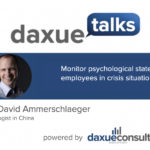Daxue Talks transcript #44: Measuring the impact of the coronavirus outbreak on employees’ psychology
COVID-19 outbreak impact
In this episode of Daxue Talks David Ammerschlaeger, a psychologist and the head of psychology at ChingHo clinic, measures the impact of the coronavirus outbreak on employees’ psychology.
Full transcript below:
Welcome to Daxue Talks, a show powered by Daxue Consulting, a China-based strategic market research company founded in 2010.
My name is David Ammerschlaeger, I am a psychologist and I am the head of psychology at ChingHo clinic. I am also an executive coach and a member of the shanghai international mental health association and the British Psychological Society and I am very happy to be here tonight.
How can you evaluate the effect of Coronavirus on the mental health of people in China?
So, during this period of time, people of China have been strongly affected psychologically. Simply put, if you look at some research performed by the Chinese psychological society during the past few weeks, we have actually found that 42.6% of people have clinical levels of anxiety related to the epidemic and 21.5% have obvious symptoms of clinical PTSD – that’s post-traumatic stress disorder and 16.6% had mild to severe clinical levels of depression, and that is something that is way off the chart compared to normal levels which are slightly about 50% of these levels. So right now I would say these main areas of mental health have doubled and this is only the main thing that has been tested, the study focuses on clinical disorders but does not report any other issues that impact the well-being, such as family conflicts, hardship related to education, parenting, while children are experiencing online schooling, feeling of isolation and loneliness, all these things have not been include in the study because they are not really clinical disorders as such. But if you look for example on Weibo, there was a hashtag that was translated to #how to deal with feelings, very anxious at home and that was trending with more than 290 million views. That shows how many people actually are concerned about these feelings. And that’s only the ones that are in English, it’s not even in mandarin or something like that, right.
So, beyond that, many people are afraid now of losing their jobs as well because of the economic downturn. So there is a tremendous effort from Chinese authorities, so there is, for example, the psychological crisis intervention working committee from the Chinese psychological society that has strongly pointed out that we need to have a sustained focus on psychological support through professional helplines, psychotherapy and most importantly a better level of general awareness and acceptance. And that goes through less stigmatization of psychological distress.
So, for example, there’s also other things, like physical health and I have colleagues at ChingHo clinic that see a lot of people who have sleeping issues, aches in the back due to bad postures at home, they are dealing with a lot of different issues, around nutrition as well. So, there is a lot of things that are related to physical health and mental health.
How has the work-life balance of employees in China changed over the last months?
So, the problem with work from home is that there is no clear limit between the private’s fear and the professionals’ fear. Your workday kind of blurs together into your home life. So, it feels like you’re working or at least you are on duty all the time. It is important for preventing burnout to have clear boundaries. But it’s also important for emotional management to set clear boundaries of what is my responsibility of area of control, and what is outside of my control. In addition to that, schools are not physically taking charge of the children, so I have a lot of clients at ChingHo clinic experiencing some overwhelm handling children at home and work, it is probably even more difficult now that the children are home as well and the whole family is trying to focus on their respective tasks, that’s from school, overseeing the homework of the children, but also working at the office at the same time. Here we have two things that are overlapping basically. And you also have household tasks because a lot of Ai’s did not come back from their home cities or something like that. So, there’s a lot of pressure right now on parents. Now having said that, psychologically the advantages also put people in front of their demons – and that’s true because when you’re at home there’s only that much that you can do, right. And when you’re working there, on one side you’re truly independent and can get more work done without colleagues talking to you all the time, but I have also observed that in many cases people struggle with focus and concentration and actually motivation, engagement and stuff like this. So many people have a tough time focusing and staying productive and efficient the whole day.
Working from home means you must rely on self-motivation, self-discipline, focus and concentration and the other thing is that you rely more on the active effort to communicate. Usually, when you have people in the office you can talk to your colleague whenever you want, but right now it’s not possible and you have to actually make a call or actually engage into something and yet the communication is sometimes a little bit – how should I say it – fractions, because you might chat, you might send a message or an email and then the other person responds one hour later. So, it’s less direct than it is when you’re in the office.
So, work from home is something that has been very uncommon in China. Until now we have very few companies and very few instances of work from home or home office. Often companies don’t trust employees to perform well or to be sufficiently engaged, so this has actually forced companies into the situation. But if you look at other countries, it’s something that is quite common nowadays. For example, according to the bureau of labor statistics – 57% of workers in 2018 had a flexible schedule and 42 million wage and salary workers, that’s actually 29% of the workforce in the United States, could work from home. So, that actually is something that is even used by employers to seduce workers coming and working in a specific company and there has been a lot of research by the human resource department into saying okay – how much does it cost and actually how much do we benefit from these things. A lot of things that actually employees have pointed out as being advantages, working from home in these surveys was that they felt there was a stronger control over the work-life balance. They also reported increased productivity levels, less stress and many of them also felt that avoiding commute was actually improving their well-being and the way they actually saw and engaged in their work. So, I would say this is a unique opportunity for China and for workers in China to show the company that they can perform and work from home and I really hope that employees are smart enough to satisfy the employers and to prove that this is a visible thing that is happening to them so that they can actually make a significant difference in showing the employers that this can also lead to performance. There is also something that I wanted to say, the problem between – in this environment is that because of this crisis people have a tendency to distance themselves from each other, physically and maybe even emotionally. People have stayed at home – and that is true for the work-life but it’s also true for the personal life. A lot of people have not seen their friends, their families for a long time. So, people have lost a little bit of touch with each other and if that is true for family and friends, this is also even more true with colleagues. People haven’t engaged personally and usually when you are in the office, there’s a lot of small talks, a lot of non-verbal cues and a lot of physical communication basically that happens, and that is not the case anymore and whenever now after so many weeks of not talking to each other – suddenly we start talking to each other through phones or something like that, it seems more disconnected and more artificial basically.
Any questions? We will find an expert to answer them. Drop your questions in the comments or send us an email – dx@daxueconsulting.com.















